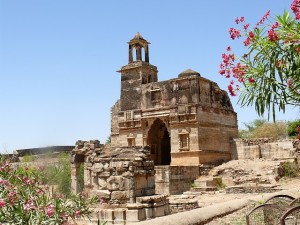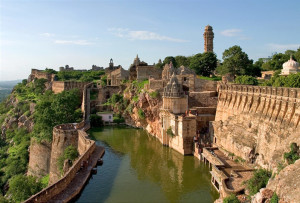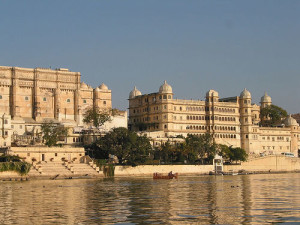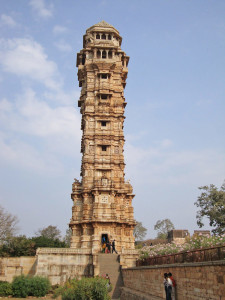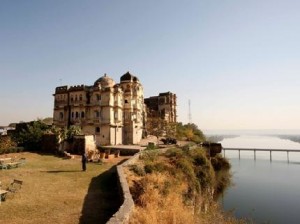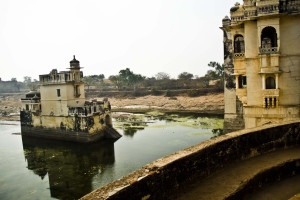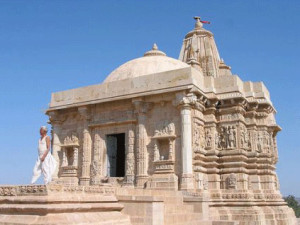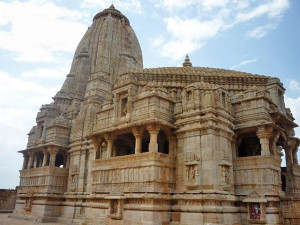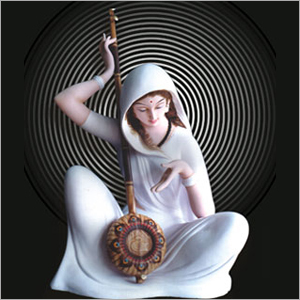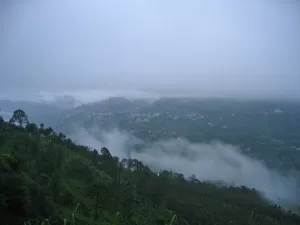Chittorgarh is an ancient city in Rajasthan state of western India. The origin of Chittorgarh can be traced to the seventh century. It lies on the Berach River, a tributary of the Banas, and is the administrative headquarters of Chittorgharh District and a former capital of the erstwhile kingdom of Mewar. It remained the capital of the local Sisodia clan of Rajputs from the eighth to the 16th century.
A tour to Chittorgarh allows one to explore the history. The interesting places there like Chitorgarh Fort and etc. reveal a lot of secrets hidden in the history of Rajasthan. Chittorgarh is pride & glory of Rajasthan, Chittaur echoes with the tales of romance and valour unique to the Rajput tradition.
A ruined citadel, where the royal past lives in its imposing forts, graceful palaces and spectacular chatris.This fortified settlement has been ravaged thrice and each time the outcome was ‘ Jauhar’ – when women and children immolated themselves on a huge funeral pyre while men donned in saffron robes of matyrdom rode out of the fort towards certain death. Alauddin Khilji was first to sack Chitaur in 1303 A.D. overpowered by a passionate desire to posses the regal beauty, queen padmini. Legend has it he saw her face in the reflection of a mirror and was struck by her mesemering beauty. But the noble queen preffered death to dishonour and committed ‘Jauhar’.Prime Tourist Places in and around Chittorgarh
Chittorgarh Fort :
It is situated 631kms away from Delhi in the state of Rajasthan. The fort of Chittor thrills one’s heart with the reminiscence of the heroic deeds. The fort plainly known as Chittor was the capital of Mewar , it is spread over a rocky hill of about 152kms,constructed in around 7th century by Chitrang maurya.The fort has seven gates and are named as Padan Pol, Bhairon Pol, Hanuman Pol, Ganesh Pol, Jodla Pol, Laxman Pol and the main entry gate of Lord Ramas that is Ram Pol Within the fort, a circular road provides access to all gates and monument located within the fort walls. All the gateways to the fort have been built as massive stone structures. The main gate of the fort is called the surajpol meaning the Gate of Sun. The doors of the gates with pointed arches are reinforced to fend off canon shots and elephants. The fort once boasted of 84 water bodies, but unfortunately is left with only 22 now. These water bodies are in the form of ponds, wells and step wells.
Rana Kumbha’s Palace:
The fort was the brain-child of Rana Kumbha, hence his palace is understandably the oldest structures here. Enter the palace through the Suraj Pol, to the saqbha or council chamber bordered by a Ganesha Temple and the Zenana. The palace complex also houses smaller chambers, which might have been used by the nobles in the king’s court. The central courtyard is the site where Rani Padmini committed jauhar, along with the other women of Chittorgarh, to save them from falling in the hands of the enemy. The palace has intricately carved canopied balconies and a stable-like structure, which must have housed horses and elephants, but is today in ruins.Fateh Prakash Palace:
Located near Rana Kumbha’s Palace, this was home to Maharana Fateh Singh. One part of this palace has been converted to museum and houses interesting articles including swords, utensils and royal garments for public viewing. Open from: 10.00 am-4.00 pm (Friday closed)Bassi Wildlife Sanctuary: Located in the Bassi Village, almost 25 kms from Chittorgarh, you would view a profusion of panthers, wild boars, antelopes, mongooses and several migratory birds. If you intimate in advance, you could also enjoy a wildlife tour on horseback.
Victory Tower :
The victory tower or vijay Stambha is the symbol of Chittor and a particularly bold expression triumph, was established by Rana Khumba between 1458 and 1468 to commemorate his victory over Mohammed Shah I Khilji, the Sultan of Malwa, in 1440 AD. It is approximately 122ft long and has a narrow circular staircase of about 157 steps, consists of 8 floors. The dome which was added later to the building got damaged because of the lightning and was repaired around in 19th century.Bhainsrorgarh Fort:
This is credited to be one of the forts, which was never conquered. Located on a 230 ft high rock, its accessibility makes it impregnable. The fort is accessed only by one route, while the remaining three sides open to precarious drops. The fort still houses the original family of Baroli and is not open to the public.Menal: Located 78 kms from Chittor, this is termed as Little Khajuraho. Of course erotic carvings are not as profuse as in Khajuraho, but if you visit the Shiva Temple here, you could see erotic carvings of gods and goddesses adorning the walls.
Kunwar Pade ka Mahal: This palace housed the prince of Chittor and is the first instance of use of S-shaped arches in Rajput architecture. These arches are also found in the Palace of Rana Ratan Singh, as well as in most temples and step wells constructed later. A special feature of the Kunwar Palace is the excessive use of blue tiles.
Rani Padmini’s Palace:
This three storeyed white building is surrounded by a pool and crowned by carved chhatris. This is also the historical site where Allauddin got the glimpse of Rani Padmini that set him off towards attacking the fort in order to possess her. Located within the palace complex is Bhimlat Kund, an artificial tank built in memory of the Pandava brother, Bhima.Kirti Stambha :
Also known as the Tower of Fame , a 72ft high tower built on a 30 ft base with 4.6ft at the top. It was constructed by Bagherwal Jain merchant Jijaji rathod , is older and smaller than the Victory Tower. It is a six storey building, the top most floor consists of 12 columns and was built around 15th century.Palaces of Jaimal and Patta: Jaimal and Patta were among the most renowned and strongest defenders of the Chittorgarh Fort. They resided in what was among the last structures to be constructed in Chittorgarh. These are not really palaces, but simple houses with minimally decorated facades and lack the opulence of the other palaces. Located a little away from these palaces is the three-storeyed now in ruins, Chonda House.
Kalika Mata Temple :
An extremely popular temple is the dedicated to the Mother Goddess. The temple has five chambers and the inner walls lack intricate carvings except those of lotus flowers. The inner sanctum has an image of the Sun God and the walls here have images of Chandra or the moon. Almost all carvings are dominated by themes of Surya surrounded by other deities. Similar to the Kalika Mata Temple.Jain Temples : In the total of six Jain temples, the temple of Bhagwan Adinath is the largest and consists of 52 Devkulikas. The Digambar Jain Kirtstambha and the seven storied Kirtistambh are the famous two among them
Kumbhashyama Temple is dedicated to Lord Krishna. The use of precious stones is abundant and images of gods, goddesses and the eight rulers adorn the walls. The 16th Century
Adbhutnath Temple shows unrefined images of gods. The main idol within is that of Lord Shiva as the Destroyer, made in wood and sporting three faces. The
Bhawani Temple, dedicated to the Tulja Goddess, patron deity of the Chittor tribes. Next to the temple is the tope khana, which still houses old cannons.
Meera temple:
The temple is dedicated to the mystic poetess Meerabai, and a devotee of Lord Krishna. Meera was born in Kurki village near Merta to Ratan Singh Rathors, and was married to Bhojraj son of Rana Sanga of Mewar. Legends say that she consumed poison set by Vikramaditya but nothing happended to her due to the blessings of Lord Krishna. In front of the temple is the cenotaph (chhatri) of Meera Bai’s Guru Shri Rai Das of Banaras, inside the cenotaph is carved a figure of five human bodies with one head, depicting that all castes are equal and even outcasts can attain God.Chittorgarh Climate:-
The temperatures ranges between 25ºC to 45ºC in summers in Chittorgarh while winters are cooler and pleasanter with a temperature range between 10ºC to 30ºC. In this area, rainfall is scanty and generally ranges between 60 to 85 cm.
Chittorgarh Bed and Breakfast
There are a myriad of hotels located near the key areas of interest that can be booked in advance.Accommodation is possible with prices starting from Rs 400 for normal rooms till Rs 3,600 for star hotels. Deluxe rooms also comparatively cost less than Rs 2,000 and offer state-of-the –art amenities. Hotel services include Money Exchange, Safe Deposit, Swimming Pool, Travel Desk, Laundry and Car Rentals.
There are restaurants that provide Indian, Chinese, Continental and “Traditional Rajasthani Meals” for breakfast, lunch and dinner with Rajasthani ambience. All deluxe and luxury rooms have air-conditioning which is required in summer, but if you are planning to visit Chittorgarh in winter, this is not required.
Shopping in Chittorgarh
Chittaurgarh is simply the right location to get your hands around the appealing wooden toys which are produced by the rural individuals from Bassi, a village close to Chittorgarh. Visitors could be seen getting Pratapgarh unique, ‘Thewa’ posts, Akola’s printed cloth of Akola and leather ‘Mojri’, a specialty of Gangaur, as mementos and gifts for their family members. The best locations to go for that looking spree are Sadar Bazaar, New Cloth Marketplace, Fort Road Marketplace, Rana Sanga Market, Gandhi Chowk and Station Circle.
Getting There
By Air: Udaipur is the nearest airport. Daily flight form Delhi, Mumbai, Jaipur and Lucknow are available to Udaipur
By Rail: Chittaurgarh has rail links with Ahmedabad, Chittaurgarh, Udaipur, Jaipur, Kota, Alwar and Delhi.
By Road: Rajasthan Roadways run very comfortable deluxe & air conditioned buses from Jaipur to Chittaurgarh. It is also connected by road to Delhi, Mount Abu, Chittaurgarh, Bundi and Udaipuri.

